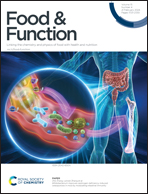Efficacy of antioxidant supplementation in improving endocrine, hormonal, inflammatory, and metabolic statuses of PCOS: a meta-analysis and systematic review†
Abstract
Background and aim: A large number of recent studies have reported on the use of antioxidants in patients with polycystic ovary syndrome (PCOS). This study aimed to evaluate the antioxidant effects on PCOS. Methods: We searched PubMed, Embase, Web of Science, and The Cochrane Library to identify randomized controlled trials investigating the use of antioxidants in treating PCOS. Statistical analysis was performed using Review Manager 5.4. Stata17.0 software was used to conduct sensitivity analyses. Results: This meta-analysis included 49 articles and 62 studies. The sample comprised 1657 patients with PCOS from the antioxidant group and 1619 with PCOS from the placebo group. The meta-analysis revealed that the fasting blood glucose levels [standardized mean difference (SMD): −0.31, 95% confidence interval (CI): −0.39 to −0.22, P < 0.00001], the homeostatic model assessment of insulin resistance (SMD: −0.68, 95% CI: −0.87 to −0.50], P < 0.00001), and insulin levels (SMD: −0.68, 95% CI: −0.79 to −0.58, P < 0.00001) were significantly lower in patients with PCOS taking antioxidants than those in the placebo group. Further, total cholesterol levels (SMD: −0.38, 95% CI: −0.56 to −0.20, P < 0.001), low-density lipoprotein cholesterol levels (SMD: −0.24, 95% CI: −0.37 to −0.10, P = 0.0008), and very low-density lipoprotein levels (SMD: −0.53, 95% CI: −0.65 to −0.41, P < 0.00001) were lower in patients with PCOS taking antioxidant supplements compared with the placebo group. Total testosterone (TT) level (SMD: −0.78, 95% CI: −1.15 to −0.42, P < 0.0001), dehydroepiandrosterone level (SMD: −0.42, 95% CI: −0.58 to −0.25, P < 0.00001), and mean standard deviation modified Ferriman-Gallway (MF-G scores) (SMD: −0.63, 95% CI: −0.98 to −0.28, P = 0.0004) were lower in patients taking antioxidant supplements. C-reactive protein (CRP) levels (SMD: −0.48, 95% CI: −0.63 to −0.34, P < 0.000001), body mass index [mean difference (MD): −0.27, 95% CI: −0.50 to −0.03, P = 0.03], weight (MD: −0.73, 95% CI: −1.35 to −0.11, P = 0.02), and diastolic blood pressure (MD: −3.78, 95% CI: −6.30 to −1.26, P = 0.003) were significantly lower. Moreover, the levels of sex hormone–binding protein (SMD: 0.23, 95% CI: 0.07–0.38, P = 0.004), high-density lipoprotein cholesterol (SMD: 0.11, 95% CI: 0.01–0.20, P = 0.03), total antioxidant capacity (SMD: 0.59, 95% CI: 0.31–0.87, P < 0.0001), and quantitative insulin sensitivity index (SMD: 0.01, 95% CI: 0.01–0.02, P < 0.00001) were higher in patients with PCOS who took antioxidant supplements compared with the placebo group. Antioxidant supplements did not affect other analyzed parameters in these patients, including follicle-stimulating hormone, free androgen index, nitric oxide, glutathione, malondialdehyde, and diastolic blood pressure. Conclusions: Antioxidants are beneficial in treating PCOS. Our study might provide a new treatment strategy for patients with clinical PCOS. We hope that more high-quality studies evaluating the effects of antioxidants on patients with PCOS will be conducted in the future. Registration: https://www.crd.york.ac.uk/prospero/, identifier CRD42023448088.

- This article is part of the themed collection: Food & Function Review Articles 2024


 Please wait while we load your content...
Please wait while we load your content...